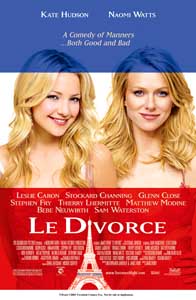-
- U.S. Episcopalians approve first openly gay bishop
- AIDS making a comeback in the U.S.
- Episcopal leaders deem same-sex union ceremonies acceptable
- Young lesbian’s stabbing death far from resolved
- NGLTF leader warns of backlash at annual Dignity meeting
- Group founded by gay bishop creates ‘safe space’ for teens
- Editor of GLBT paper appeals censorship ruling
- Probe continues into phone message accusing Arizona governor of gay agenda
- National News Briefs
- World News Briefs
Arts & Entertainment
An (Ugly) American in Paris
Merchant-Ivory’s ‘Le Divorce’ is a bust, despite strong cast
Published Thursday, 14-Aug-2003 in issue 816
Neither a sophisticated comedy nor a full-on drama, Le Divorce falls — quite flatly, I’m afraid — somewhere in between. The latest in a long, mostly distinguished, line of collaborations between director James Ivory and producer Ismail Merchant (including Heat and Dust, Howards End and A Room With a View), Le Divorce has a contemporary look and setting, but nonetheless feels vaguely mired in the past — not so coincidentally the period in which Ivory has done his best work.
Diane Johnson’s 1997 best-selling novel of the same name (a National Book Award finalist for fiction), adapted by Ruth Prawer Jhabvala (who copped well-deserved Oscars for Howards End and A Room with a View), is an update of sorts of Henry James’ Portrait of a Lady, with Johnson’s lead character, Isabel Walker, standing in for Portrait’s Isabel Archer. (Johnson, an American who once lived in Paris, has called Walker Archer’s “anti-prototype.”) But unlike her timid 19th century counterpart, this Isabel speaks her mind, wears form-fitting clothes and is sexually adventurous.
Immediately upon arriving in Paris to visit her pregnant sister, Roxeanne (Naomi Watts), Isabel (Kate Hudson) learns that Roxy’s French husband, Charles-Henri (Melvil Poupand), has left her. Isabel’s reaction to this bit of news? Bed a skuzzy Frenchman (Romain Duris, so appealing in L’Auberge Espagnole), then leap into an affair with a handsome married diplomat (Thierry Lhermitte), a member of Roxy’s extended French family. (We think she’s plotting something, but no such luck.) Siblings don’t get much more caring, do they?
Roxy’s marriage looks to be over for certain when Charles-Henri hires a divorce lawyer to assess the value of their mutual property, one item of which is a painting on loan from her parents that is quite likely an important work by 17th century artist Georges de La Tour. There is an attempted suicide, a double murder and lots of snarling between the Americans and French, but still nothing much of interest happens in the remainder of Le Divorce. With a (mostly wasted) cast that includes Leslie Caron, Sam Waterston, Stockard Channing, Glenn Close (who looks like a witch with her long, grayed hair), Bebe Neuwirth and Stephen Fry (giving the film a much-needed, albeit temporary, energy boost), how is this possible? Could the source material (which I haven’t read) really be this sluggish and non-eventful? Or did Ivory (as co-writer) and Jhabvala simply do a bad job of adapting it?
Considering that his last three films — Jefferson in Paris, A Soldier’s Daughter Never Cries and the sleep-inducing The Golden Bowl — were financial and artistic flops, it seems reasonable to suggest that the 75-year-old Ivory’s artistic instincts have greatly dulled over the past decade. (The first scene in Le Divorce to really hold my attention, which occurs an hour and fifteen minutes into the proceedings, was the series of mouth-watering close-ups of the gorgeously prepared lunch Isabel and her family share. What does that say about the film’s lack of substance?) He’s made some wonderful films (especially Maurice, The Remains of the Day, Howards End and A Room with a View), even managing to co-create his own genre of movies in the process (the simultaneously revered and loathed “Merchant-Ivory production”). But it appears the bloom is seriously off the rose for this once-esteemed team of filmmakers. Le Divorce? Le Bore is more like it.
Le Divorce starts Aug. 15 at Landmark’s La Jolla Village Cinemas. For more information, call (858) 453-7831.
Kyle Counts is the Gay and Lesbian Times film critic .
|
|
Copyright © 2003-2025 Uptown Publications


